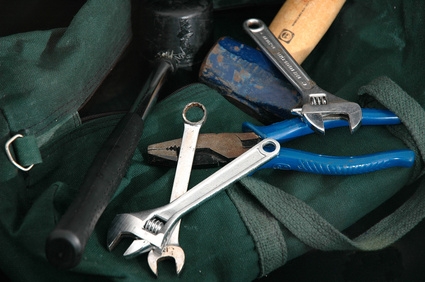
The Toyota Tacoma, a solid vehicle known for its reliability, is nonetheless just as susceptible to rear-end problems as other vehicles. Rear-end noise can have numerous causes, although some are more common. To diagnose the source of noise, note at which point during driving the sound becomes audible. The timing and pitch of the sound can help you pinpoint the exact cause, since different mechanical problems often manifest through distinctly varying sounds.
Rear universal joints, commonly called U-joints, generally require replacement at least once during the lifespan of a rear-wheel-drive vehicle such as the Tacoma. The U-joints will often make a metal clunking sound when you place the truck into gear if they require replacement. The joints sometimes make a loud vibrating noise as you accelerate the truck over 50 mph, and the sound will often increase with speed. Replacing U-joints is fairly inexpensive and not difficult, making it a good place to start with diagnosing the sound.
A hole in the muffler can become dangerous, as it allows carbon monoxide to leak from the exhaust into the truck's cabin. A hole in the muffler can cause a distinct noise in the rear end of a Tacoma. A loud, deep rumble --- usually loudest upon acceleration --- typically indicates a leaking muffler. Inspect the muffler for any obvious holes or rotted portions possibly responsible for the leak.
If the rear brakes are responsible for the audible noise in your truck, you'll often only notice the sound during braking. It may sound like squealing or chirping as you depress the brake pedal. Sometimes the sound can result from brake dust, or your truck may need new brake components. When inspecting the brakes on your truck, remember not to use quick or temporary fixes when it comes to your truck's braking system.
The rear differential is a mechanism in your truck that transfers engine power and delivers it to the wheels. During a turn, the wheels on a vehicle operate at different speeds --- the origin of the term "differential." If the differential needs repair or replacement, you may hear a rear-end noise that whines or grinds specifically during a turn. If you suspect the noise stems from the rear differential, take your truck to a mechanic immediately; do not attempt this difficult job on your own.